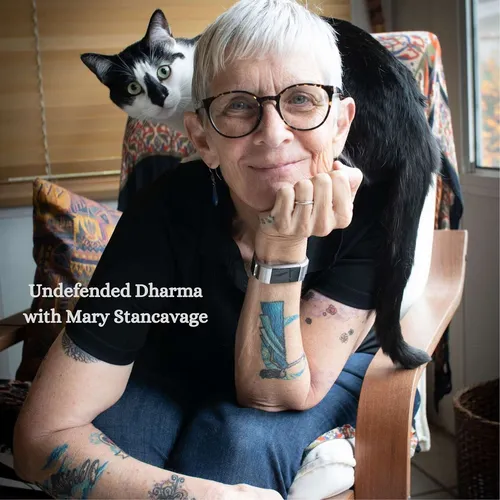
Undefended Dharma with Mary Stancavage
Dharma talks from meditation teacher Mary Stancavage. These focus primarily on the pragmatic aspects of Buddhist teachings and philosophy drawing strongly on wisdom and heart practices. All are viewed through the lens of learning to live with an Undefended Heart. (photo by @kimanhuynh)
- Update frequency
- every 7 days
- Average duration
- 28 minutes
- Episodes
- 343
- Years Active
- 2018 - 2025

Nothing Lasts Forever
Whether we like it or not, impermanence is a way of life. In fact the Buddha taught that it was one of the three characteristics of existence yet we still try to hold on to things, ideas, and experi…

I See You Mara
In Buddhist teachings Mara is seen as the personification of greed, anger and delusion and stands in the way of our liberation. In this talk Mary offers ways to identify Mara in our own lives which …

The Human Condition
The term Human Condition can sum up our experiences on this planet, whether we admit to it our not. The Human Condition is also what the Buddha teaches in the First and Second Noble Truth especially…

I'm So Happy for You!
Appreciative Joy, or Mudita, is one of the heart practices and often considered the most difficult. This is an altruistic expression of joy for the good fortune and happiness of others and is an impo…

The Meaning of Life
Often we latch on to the search for meaning, happiness or bliss and think they are "out there" waiting to be found or achieved. Drawing heavily on the work of Viktor Frankl, Mary reminds us that the…

The Dhammapada
The Dhammapada, part of the Pali Canon, is one of the most popular collections of Buddha's teachings. Mary looks at some of the verses and how the entire collection is an easy way to remind ourselves…

Decolonizing the Mind
Dharma practice teaches us how to disentangle ourselves from habitual thoughts and habits of mind. It can also support us as we disengage from the larger, systemic patterns baked into our culture. Ma…

The Eightfold Path: Right Concentration
The last factor in the Eightfold Path is often called Right Concentration, but it more about a steadiness or collectedness of the mind. Mary discusses this final piece and how the clarity and wisdom …

The Eightfold Path: Right Mindfulness Part 2
Continuing with the Four Foundations of Mindfulness, Mary discusses how these practices, when aligned with the Eightfold Path, lead to the end of suffering and facilitate awakening.
Recorded August 2…

The Eightfold Path: Right Mindfulness Part 1
Right Mindfulness underpins just about everything we do in our practice and is necessary for liberation. Without the clarity of present time awareness and the integrity to guide our mindfulness skill…

The Eightfold Path: Right Effort
It takes effort to move from suffering to the end of suffering and the Buddha dedicated an entire factor of the Eightfold Path to this. Mary talks about the Four Efforts necessary to disentangle ours…

The Eightfold Path: Right Livelihood
The final factor in Sila or ethical behavior, Right Livelihood is more than just about how we make our living. It's how we interact with the world: where we spend our money, how we meet our needs and…

The Eightfold Path: Right Action
Right Action is the second part of Sila, or the ethics portion of the Eightfold Path, and includes some of the most powerful practices for living in the world in harmony with other beings. Together w…

The Eightfold Path: Right Speech
Right Speech can also be considered Right Communication. How we show up in the world and communicate with others is so important and critical in moving on this path toward liberation for ourselves, a…

The Eightfold Path: Right Intention
Continuing the series on The Eightfold Path, Mary discusses Right Intention and the three components: Renunciation, Good Will and Harmlessness. This factor works to break up the defilements of greed …

The Eightfold Path: Right View
The Eightfold Path is the Buddha's the path to end suffering. In this video Mary discusses Right View, the first factor in the path. Right View allows us to move away from ignorance - seeing where we…

Meditation: Lovingkindness (Metta)
In this Lovingkindness, or Metta, meditation, Mary guides us in finding the phrases that are meaningful to us. Metta is a powerful practice to soften our hearts both to ourselves and to all beings.
Re…

Anatta: The Conditioned Self
Along with the Impermanence (Anicca) and Suffering (Dukkha), the teaching of Anatta or non-self is one of the Three Characteristics of Existence taught by the Buddha. In this talk Mary discusses what…

The Four Protective Meditations
Ancient teachers in the Theravada tradition collected four meditation subjects which the Buddha taught that they considered to be protective and worthy of dedicated practice. Drawing on work by Bhikk…

Look Around
This short talk is a reflection on how we can see the dharma everywhere if we keep our eyes and ears open. It is so easy to keep ourselves and others separated into different containers when in reali…